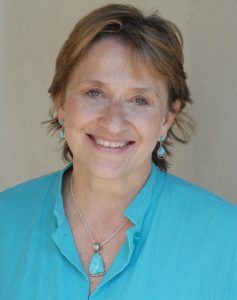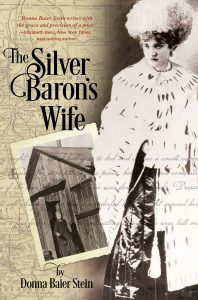Happy New Year, writers!
We’re kicking off a new year here at Called to Write with a new author insights series featuring book giveaways. I’ll be introducing you to writers who’ve taken their writing all the way to the finish line of publication, and they’ll be sharing their “lessons learned” stories with you. There’s nothing quite like learning from a writer who has made to the other side.
Plus, if you leave a comment at the end of the post before Tuesday, January 17th, you’ll be entered to win an autographed copy of the author’s book in a random drawing. (You must be located in the United States to win.)
Meet Donna Baier Stein, author of The Silver Baron’s Wife
Let me introduce you to Donna Baier Stein. Donna was a member of my Called to Write Coaching Circle in 2012 when she was working on establishing a writing habit to help her complete her first book. And the proof is in the pudding, because, ta-da, her book The Silver Baron’s Wife came out in the fall of 2016. So exciting!
I asked Donna to share her greatest insights from writing the novel.
Seven Tips From First-Time Novelist Donna Baier Stein
 I chose the historical figure of Baby Doe Tabor as the main character of my first novel thinking her fascinating, event-filled, roller coaster life provided its own ready-made plot. I’d been writing stories and knew that my strength was language, not narrative structure. I’d even spent time in two radically different writing groups—one focused on literary fiction (heavy on characterization and language) and one focused on more plot-oriented genre fiction. I, rather arrogantly it turns out, preferred the literary focus. I was definitely a pantser rather than a plotter.
I chose the historical figure of Baby Doe Tabor as the main character of my first novel thinking her fascinating, event-filled, roller coaster life provided its own ready-made plot. I’d been writing stories and knew that my strength was language, not narrative structure. I’d even spent time in two radically different writing groups—one focused on literary fiction (heavy on characterization and language) and one focused on more plot-oriented genre fiction. I, rather arrogantly it turns out, preferred the literary focus. I was definitely a pantser rather than a plotter.
So I decided to write about a woman whose life story had already been the subject of an American opera – The Ballad of Baby Doe – and several other books. There were so many events to choose from her life: her work in the silver mines of Colorado and first marriage to a philandering opium addict, a second marriage to a man worth $24 million when they married at the Willard Hotel in Washington, DC, with President Chester Arthur in attendance, her years writing down her dreams and marking visitations of spirits on her wall calendar at the Matchless Mine in Leadville. All I had to do was write what had happened in Baby Doe (Lizzie’s) life, I mistakenly thought, and voilà, I’d have a novel.
So I started my research. I researched for years, taking occasional stabs at writing early chapters. But the writing of the novel was far less easy than I’d naively hoped it might be. Here’s what I learned from my mistakes:
- A writer can do too much research. I had boxes of hard copy files and dozens of folders on my computer. And in early drafts, I put far too much emphasis on describing the physical details of clothing, furniture, food of the era. I’d say “Bluchers” when saying “boots” would have sufficed, for instance. It was only in the final drafts that I realized I could focus only on the items that the characters came into direct contact with… and see them as they would see them, not as if they were described in a museum catalog.
- Narrative arc is key. I discarded many early chapters about Lizzie’s childhood because they didn’t serve to tell the story I ultimately wanted to tell. I had to choose certain episodes of her life, ignore others, and create new ones in order to show the change in Lizzie I wanted to reveal. The novel, unlike a biography, wasn’t just about re-telling Lizzie’s life. Its purpose was to reveal a theme and a transformation in my main character.
- When writing dialogue, be inside your characters. At first, I felt intimidated by them. How could I talk like a 19th century woman talked? I did find some historically current slang phrases to toss in, but mostly I wrote dialogue as I heard Lizzie and other characters saying it in my head.
- Be inside your characters as they move through a room, too. It was like being an actress on a stage. Instead of seeing Lizzie from an outside view camera, I had to metaphorically go inside her. See what she would notice in the rundown mining cabin in Dogwood or the extravagant villa in Denver. And feel what she might have felt living in such radically different environments.
- For me, writing in first person really helped me inhabit my main character. An agent once told me that third person limited narratives were easiest to sell. I rewrote the book that way and though it came close, it didn’t sell on that go-round. I went back to the first person voice I felt most comfortable writing in, and I’m happy with the result. That was the way I wanted to tell Lizzie’s story from the beginning.
- It’s hard, though certainly not impossible, to give adequate attention to every phase of someone’s entire life. The next novel I write will focus on a much shorter time frame than 81 years.
- Don’t be obsessive about rewriting until you’ve got your story down. I must have rewritten the first pages of the novel fifty times. I thought, mistakenly, that I had to have it exactly right before moving forward. This is not the way to get a novel written.
I’ve already started writing a new novel, and I’m grateful to have the first under my belt. I’m sure I’ll learn new lessons this time, too!
About The Silver Baron’s Wife
 Kirkus Reviews called the The Silver Baron’s Wife “an artistic, sympathetic imagining of the life of a 19th-century woman who made headlines for all the wrong reasons.” Foreword Reviews gave it five stars and said, “A unique portrait of a time and place populated by fearless people, this reimagination of an uncommon woman is powerful.”
Kirkus Reviews called the The Silver Baron’s Wife “an artistic, sympathetic imagining of the life of a 19th-century woman who made headlines for all the wrong reasons.” Foreword Reviews gave it five stars and said, “A unique portrait of a time and place populated by fearless people, this reimagination of an uncommon woman is powerful.”
The Silver Baron’s Wife is available on:
- Amazon (affiliate link)
- Barnes and Noble
- IndieBound
About Donna
 Donna Baier Stein is the author of The Silver Baron’s Wife (PEN/New England Discovery Award), Sympathetic People (Iowa Fiction Award Finalist), and Sometimes You Sense the Difference.
Donna Baier Stein is the author of The Silver Baron’s Wife (PEN/New England Discovery Award), Sympathetic People (Iowa Fiction Award Finalist), and Sometimes You Sense the Difference.
She founded and publishes Tiferet Journal. She has received a Scholarship from Bread Loaf, a Fellowship from the Johns Hopkins University Writing Seminars, three Pushcart nominations, and prizes from the Allen Ginsberg Awards and elsewhere. Her writing has appeared in Writer’s Digest, Virginia Quarterly Review, New York Quarterly, Prairie Schooner, and many other journals and anthologies.
She is currently completing a new collection of stories based on Thomas Hart Benton lithographs. You can find Donna online at www.donnabaierstein.com.
Enter to Win a Copy of The Silver Baron’s Wife!
Donna has graciously agreed to give away 3 autographed copies of her book to my readers. Leave a comment on the blog about one of your own writing lessons or something you learned from Donna’s insights before Tuesday, January 17th at 5 p.m. Pacific Time and you’ll be entered in the random drawing. You must be located in the United States to win.


I learned something from each of Donna’s tips! I would love to read (and hopefully win) a copy of her book!
So glad to hear the tips were helpful, Sandi!
Donna, I’m looking forward to reading your book as I loved the opera about Baby Doe – such haunting music telling a haunting story.
Your comment about not rewriting until you have the story basically written really struck me as an important one for me to remember as I work on revising the first draft of my novel.
Thanks!
How nice you saw the Ballad of Baby Doe! I hope you enjoy my novel. And good luck your novel writing as well…
Great tips and the book sounds terrific. Huge congratulations!
Thanks, Joyel.
A couple of important points rang my bell—chiefly being inside your characters, not only for dialogue but also how they see their environment. Stellar advice. Too many books give a Sears catalog of furnishing details while the reader is probably asking “why does this matter?”
Thanks for refreshing these points
Thanks, Helen.
Thanks for commenting, Helen… yes, that was a lesson I learned the hard way!
Thank you for those tips Donna, I’m going to carefully save them. I’ve always enjoyed writing and several people suggested I should take it up as a profession. But I had my hands full with being an interpreter and raising a family, not to mention doing some growing up myself. However, I did take a writing course on Skyros, a small Greek island which Sue Townsend used to visit (I think it features in one of her books) and I really enjoyed that. So who knows, it may still not be too late.
It’s so nice to sees you here, Esther! How lovely to take a writing course on Skyros. Like you, I did other work for many years. The wonderful thing about writing is that there is truly no age limit. Just last night a friend was telling me about a woman who published her first novel at age 68. So no, it is definitely not too late! All best to you…
I found your remarks especially helpful regarding writing periods of history. Also writing from point of view. Thanks for sharing.
Thanks, Margaret. Good luck with your own writing.
I’m from Leadville and grew up with stories of Baby Doe and the Tabors. What a surprise to see a new book about her in a newsletter about writing! I’m taking it as a sign to not put off my writing. I love this list of tips because they help new writers get past some of the biggest things that trip us up. This one: “…focus only on the items that the characters came into direct contact with… and see them as they would see them, not as if they were described in a museum catalog.” I imagine the author visited my hometown and found no shortage of information and museums. I’m excited to read the book and see her take on Lizzie’s fascinating life story.
Dear Kari,
Yes I visited your hometown often! I love going to the Matchless Mine and was there again in September on my book tour. I love Leadville. Very cool that you grew up there. Please let me know how you like the book and how it compares to the stories you’ve heard about Lizzie. And yes, take this as a sign to continue your own writing!
I especially appreciated the tip not to do too much research. If it was a subject I was interested enough to write about, I can definitely see myself nerding out and thinking everyone needed to know every single detail of what I learned. That would be especially hard in fiction. Thanks for that reminder!
Yes! I was so fascinated by Baby Doe’s life that I easily lost myself in research. Nerding out is easy when we’re interested in the topic :)
The pitfalls about rewriting the first chapter over again and again as well as doing much research helped me to see I’ve been doung the same. They keep me from moving forward with me writing.
Yes, we can get stuck being perfectionists! Good luck moving beyond the beginning of your novel, Jessica.
Hello! I was unfamiliar with your work until now, but seeing Jenna involved I know I have to read further and learn more from you. As an amateur writer I’m always curious whether a person writes from the mind, heart, or maybe even their higher self or something higher than that? Or would you say all the above and more?
That’s a question close to my heart, Dan. I do think writers/artists can act as conduits for something higher than ourselves. And I admire Jenna as much as you do!
Thanks for entering, everyone! Our winners are the first, second, and fifth entries, as generated by my random number generator, which means our winners are: Sandi, Gaye, and Esther! We will be in touch via email to collect your mailing address information and your books will be coming to you in the mail. Thanks so much for commenting and joining in on the fun. :)